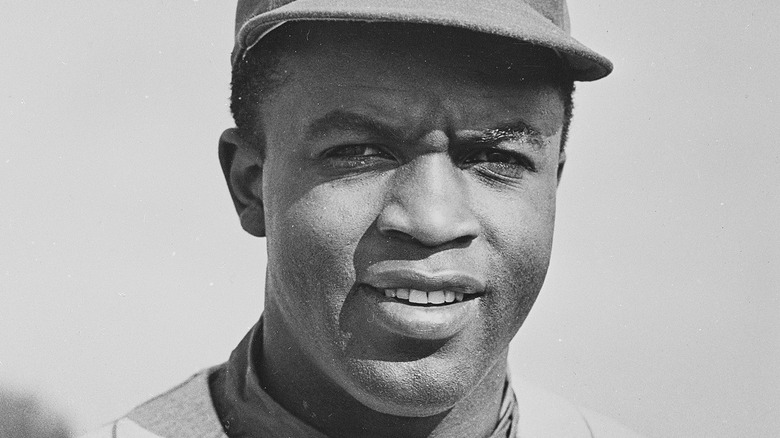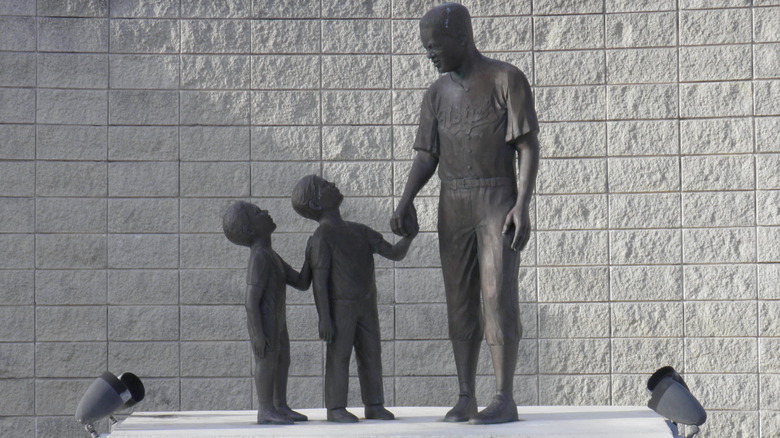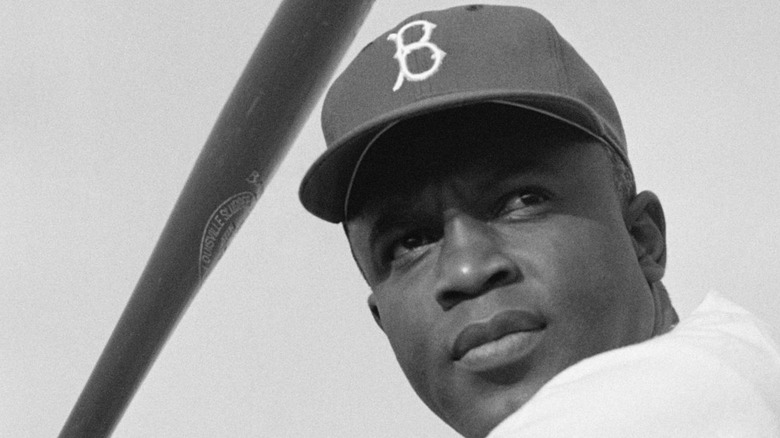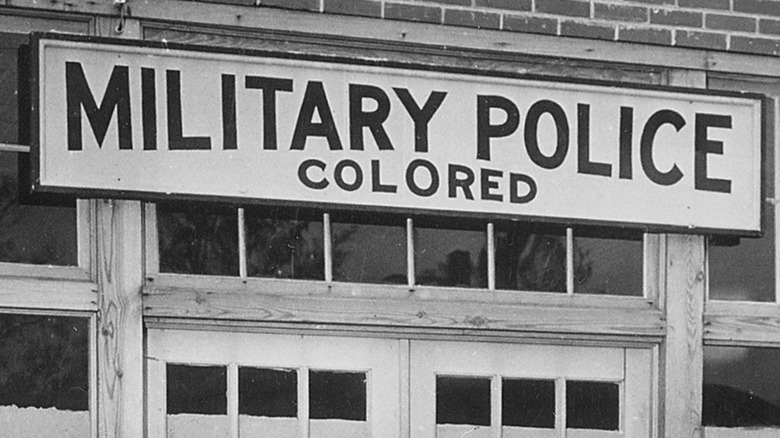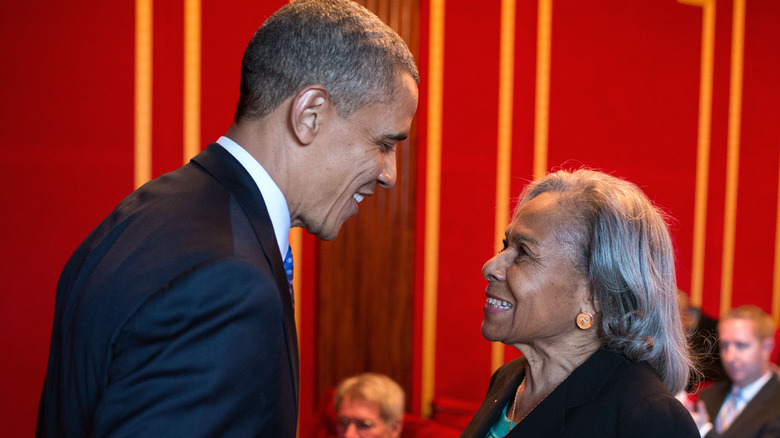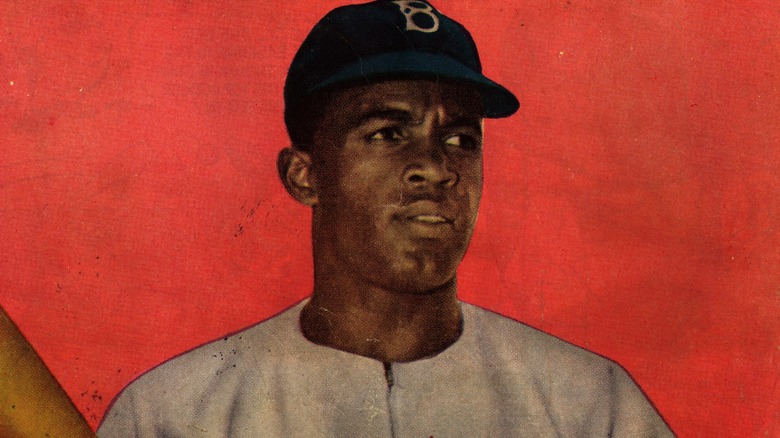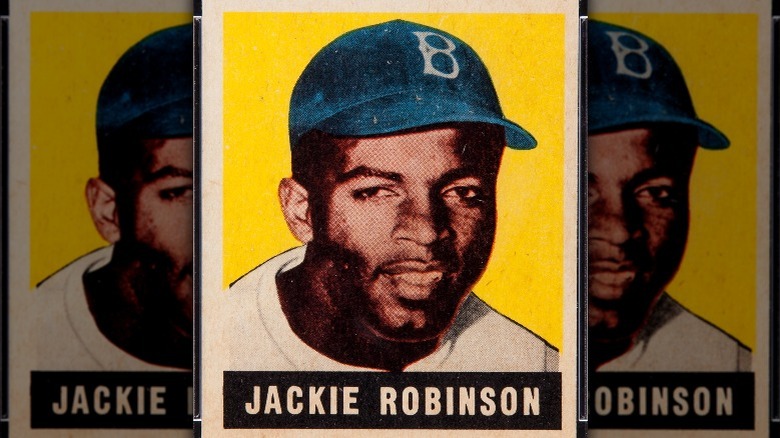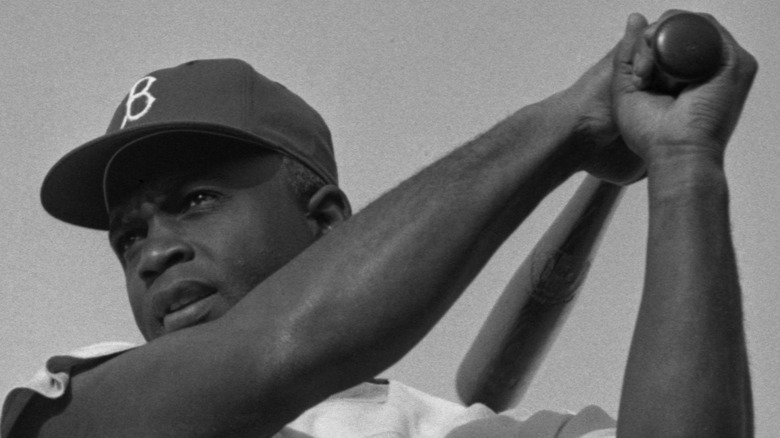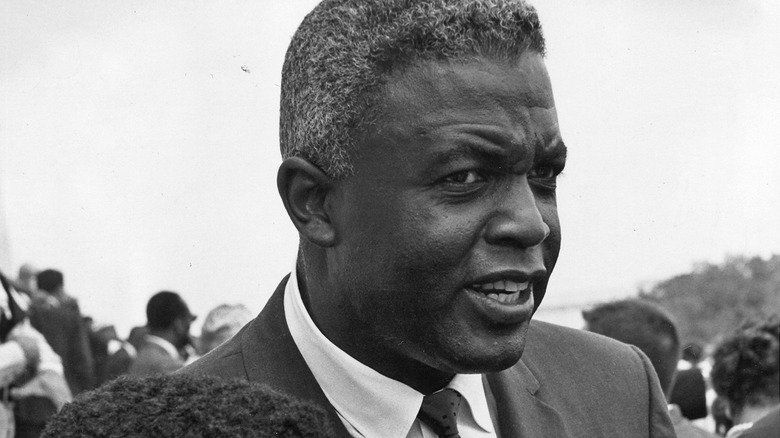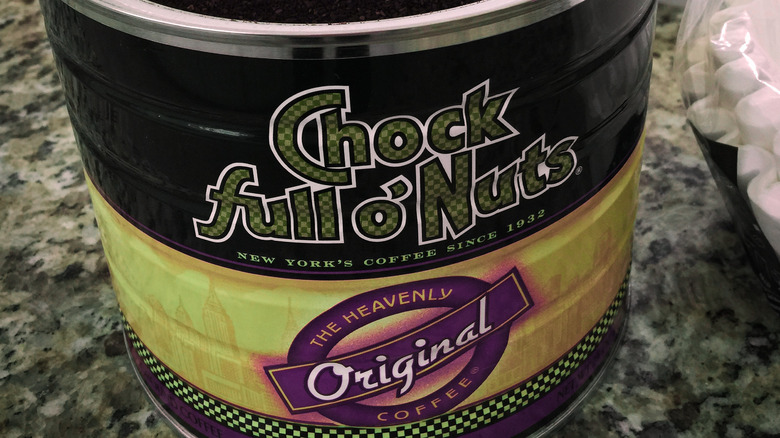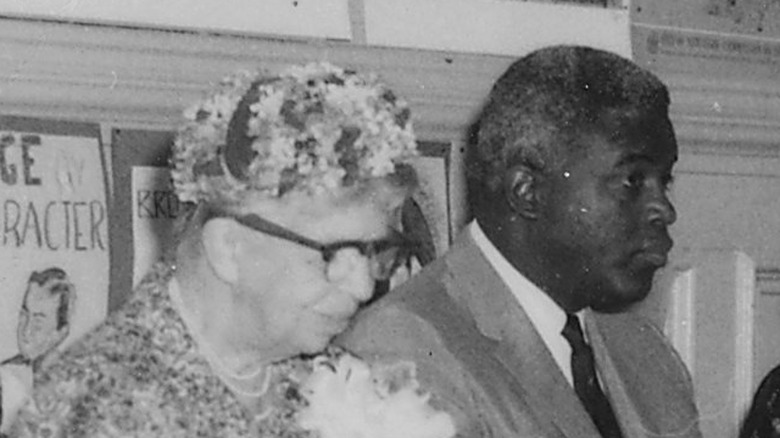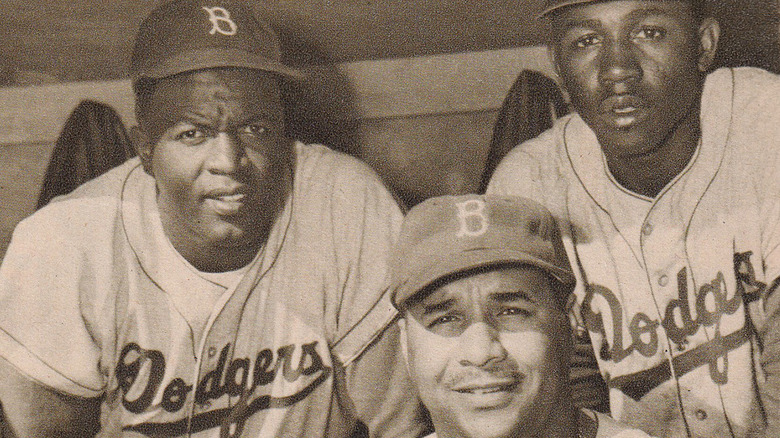The Untold Truth Of Jackie Robinson
Jackie Robinson is one of the most iconic names in baseball. You may know the struggles and triumphs of his first year in Major League Baseball, when he became the first Black player to integrate into the modern league. Still, much of what many know only comes from childhood stories or Hollywood adaptations of Robinson's life. While important, of course, there is much more to the story of Jackie Robinson, from his challenging childhood to his overcoming numerous obstacles as a teenager and young adult to his post-baseball years when he continued to break barriers (via Britannica).
He was a baseball player, but he was also a husband, a father, a civil rights activist, and a businessman. He was a pioneer, but he was also an inspiration, a symbol, and a determined human being. As with many historical figures, it's easy to narrow Jackie Robinson down to a single event or period of his life, but a full look at the man provides one with a deeper appreciation of the legacy that he leaves behind.
Jackie Robinson was raised by a single mother
Jack "Jackie" Robinson was born in Cairo, Georgia on January 31, 1919, as the youngest of five children to two sharecroppers (via History). According to the New Georgia Encyclopedia, his parents had a toxic marriage that ended when his father deserted the family for another woman when Robinson was still only a baby. This left his mother, Mallie, to raise the five children on her own. So, the following year, she decided to move the family by train to Pasadena, California where her brother lived and she could work as a maid. Despite her hard work and even taking on various side gigs over the years, the family still lived in poverty, states Biography.
As described by JackieRobinson.com, there were no other Black families living in their relatively wealthy neighborhood and, as a result, Jackie experienced racism early on. History explains how both because of the color of his skin and because his family didn't have much money, he often didn't fit in with many of the other kids in his school and was many times excluded from activities with his peers.
However, that would all change when he was a teenager.
He was a four-sport athlete in high school and college
Jackie Robinson's older brother, Matthew "Mack" Robinson (who would later go on to compete in the 1936 Berlin Olympics alongside track and field star Jesse Owens), influenced him to get into sports, according to Biography. In 1935, Jackie was enrolled in John Muir High School where he played and earned varsity letters in four sports: track and field, basketball, football, and baseball (per History).
After high school, Jackie attended UCLA, where he became the first athlete at the school to earn a letter in all four sports (via JackieRobinson.com). The NCAA describes how he excelled in collegiate sports, playing offense, defense, and special teams on the football team (as well as getting the nickname of "Lightning" for his speed) while leading the team in passing and rushing yards and points earned in 1940. Perhaps most interestingly, baseball appeared to be the sport in college that he was weakest at playing.
Ultimately, Jackie withdrew from UCLA due to financial difficulties and a need to help out his mother with raising his siblings (via Britannica). In September 1941, he then moved to Hawaii to play semi-pro football with the Honolulu Bears for $100 per game, as Black players still were not permitted in the segregated National Football League, according to Hawaii News Now. Soon after, the United States would enter World War II and Jackie Robinson's career trajectory would change too.
Jackie Robinson enlisted in the U.S. Army and fought against discrimination
For Black soldiers serving in World War II, the irony was not lost on them that they were fighting against an oppressive regime in Germany led by Adolf Hitler while also facing oppression themselves from their own government. The National Museum of World War II explains how over 1 million Black Americans served in World War II, yet all were segregated into units separate from white soldiers, sailors, and nurses.
After withdrawing from UCLA and his short-lived flirtation with semi-pro football, Jackie Robinson was drafted into the U.S. Army and stationed in a segregated unit in Kansas (via the U.S. Department of Defense). Within two years, he was ranked second lieutenant, a relative rarity for Black soldiers at the time as the War Department still viewed Black candidates as "undisciplined and inferior" (per the Georgia Historical Society).
As described by the U.S. Army Airborne & Special Operations Museum, it was in the summer of 1944 that Robinson, now a commissioned officer, refused to move to the back of his military bus after being told to by his white driver. "This is an Army bus operating on an Army post," Robinson told the driver, which enraged the man even further. Robinson would subsequently be arrested, charged, and court-martialed. According to History, he was even put under house arrest. He would ultimately be acquitted of all charges, but the experience impacted Robinson significantly.
He married his college sweetheart
On February 10, 1946, Jackie Robinson married his college sweetheart, Rachel Isum, who had been a nursing student during their time at UCLA. As stated on Biography, they would have three children — Jack, Sharon, and David — and she would also become an indispensable partner as Jackie became a nationally-known figure within the growing Civil Rights Movement due to his barrier-breaking entry into Major League Baseball. As parents, the two did their best to shield their children from the racism that they experienced in their own youth (per History).
"Jack and I heard some things I would never want to repeat," she told Sports Illustrated in 2013, adding that it was the family they were building together that kept them going through the most difficult of times. This included during their search for a home, as they constantly faced housing discrimination (per Time). According to History, it was Rachel's love that served as an "antidote" to the daily racism that Jackie faced in the public eye.
Jackie was also supportive of Rachel pursuing her own passions, including earning a master's degree from New York University in psychiatric nursing and becoming a professor at Yale University. Their lives together would see many ups and downs over their decades-long marriage though, perhaps most tragically including the death of their son Jack in an automobile accident when he was 24 years old (per New York Times).
Jackie Robinson was picked specifically by Branch Rickey to break the color barrier
Jackie Robinson entering the Major Leagues and bravely facing down extreme adversity is one of the more well-known sports stories in U.S. history. Yet, in many versions told, the details are often glossed over, including how Robinson ended up being the person who broke the color barrier in Major League Baseball.
The year was 1945 and Jackie Robinson was playing baseball for the Kansas City Monarchs in the Negro Leagues (via Library of Congress). The Negro Leagues Baseball Museum notes that during his tenure there, he was a great hitter, used his speed to steal bases, and was one of the best infielders in the league. According to the Baseball Hall of Fame, Branch Rickey, the general manager of the Brooklyn Dodgers, had been looking to integrate his team for some time and while he admired Robinson's talent, he also wanted someone with Robinson's life experiences and general attitude. Britannica describes how Rickey himself insulted and taunted Robinson in a meeting to gauge his reaction.
When Jackie Robinson finally signed the contract and joined the Brooklyn Dodgers in 1947, he proved his naysayers wrong — and Rickey right. In a private letter from Rickey to Robinson in 1950, the former wrote how the two men's relationship may have started out as a business decision on Rickey's part, but that it had become "a very real friendship" and that "most things, good or bad, just don't happen to people by accident." Robinson had, in Rickey's view, forged his own destiny.
Black and white-owned newspapers covered his rookie year differently
Just as there were separate baseball leagues for Black and white players, the media landscape was similarly segregated. As a result, one can read the coverage in both Black- and white-owned newspapers and see that there was often a stark difference between the way that they covered Jackie Robinson and his integration into the previously all-white Major Leagues. For instance, while the Black-owned newspapers in Baltimore had seven stories and numerous photographs of Robinson in celebration of Robinson's debut, in the white-owned newspaper of the city, he only received a couple of paragraphs (via the Baltimore Sun).
According to the Baseball Hall of Fame, these Black-owned newspapers and the sportswriters they employed were essential in covering the first year of Robinson's career, including commentaries on the racism and discrimination that he regularly faced. As The Atlantic points out, the role of Black-owned newspapers and journalists such as Wendell Smith of The Pittsburgh Courier were essential to the integration of the Major Leagues and providing an accurate portrayal of Robinson's first year as a Brooklyn Dodger. In 1949, a few years into his career, Life Magazine ran a column written by Robinson (although it was more about his anti-Communist views than his accomplishments), where he wrote, "I've been a laboratory specimen in a great change in organized baseball. I'm proud that I've made good on my assignment."
The backlash Jackie Robinson faced was fierce and derogatory
While most know of the blatant racism that Jackie Robinson faced during his first years in Major League Baseball, the sheer amount and level of racism and vitriol directed at him is almost unfathomable. As The Atlantic explains, Robinson understood his role both as a baseball player who was part of a team, but also as a celebrity using his fame to challenge racism and white supremacy. As a player, he remained outwardly stoic as opposing players and supposed fans yelled racial slurs at him, and pitchers purposely threw for his head (per The Philadelphia Tribune). Even some of his teammates didn't want Robinson on their team, with one circulating a petition to try and keep him off (per History).
Perhaps the most famous incident was the racist heckling of Robinson by Philadelphia Phillies manager Ben Chapman, who repeatedly called him the N-word and made other racist taunts throughout the game. According to NBC Sports, it was so bad during this game that Robinson felt, in his words, for "one wild and rage-crazed minute" he might go after Chapman, but he did not.
During this time, Robinson also found himself separated from his fellow players at restaurants and accommodations that wouldn't accept Black patrons in the Jim Crow South (via History). He and his family also received numerous death threats in his early seasons, according to the Library of Congress. Throughout all of this, he continued to perform at a high level without ever retaliating (per Britannica).
He was extremely active in the Civil Right Movements after his retirement
Jackie Robinson officially retired from Major League Baseball after being traded in 1956. This also happened to be a year after Rosa Parks made her courageous stand on a bus in Montgomery, Alabama and the Civil Rights Movement was beginning to gain steam. Both Jackie and Rachel Robinson were very active in the movement during these years. They counted Martin Luther King Jr. among their personal friends and helped raised money for his Southern Christian Leadership Conference (per MLB).
According to Biography, Jackie joined the National Association for the Advancement of Colored People (NAACP) and helped the organization raise money, joined the fight to integrate public schools, began writing newspaper columns, and co-founded a bank meant to help Black communities. He even took his son to the March on Washington for Jobs and Freedom in 1963 (via Library of Congress).
As the Civil Rights Movement progressed though, Jackie Robinson alienated many fellow activists. As early as 1960, his support for Richard Nixon's presidential campaign rubbed many activists the wrong way (per Forbes). According to MLB, Robinson challenged Malcolm X publicly in his newspaper column. In 1967, Robinson left the NAACP due to disagreements (via Biography). That same year, he also publicly disagreed with King over his anti-Vietnam War stance and although the two somewhat worked out their differences, the divide between Robinson and much of the less conservative movement had grown (per Stanford University).
Jackie Robinson was a savvy businessman
In the years following his retirement, Jackie Robinson demonstrated interest and skill in business. William Black, founder of the Chock full o'Nuts coffee company, hired Robinson almost immediately following his retirement and he served as Vice President of Personnel for seven years (per PR Newswire). This made Robinson the first Black vice president of a nationwide corporation, according to USA Today. He helped found the Freedom National Bank of Harlem in 1964 and established the Jackie Robinson Construction Company in 1970, the latter of which focused on developing low-income housing (via Jackie Robinson Foundation).
Even before his retirement though, Robinson had demonstrated an interest in business. As described by Forbes, he had signed a contract to host a radio show in 1948, helped finance and build an apartment complex in Brooklyn in 1951, and opened a men's clothing store in Harlem, simply called The Jackie Robinson Store, in 1952. According to Jet Magazine, in 1970, Don Newcombe, a former teammate of Robinson's, even stated that he studied what Robinson did in business with hopes of achieving similar success in the business world. After his death, an editorial was published in The Crisis, the magazine of the NAACP, which stated that Robinson was a "pioneer in the world of Black business" who "once having cracked a racial barrier, insisted on helping other Blacks to also get across."
After many health issues, he died of a heart attack at age 53
Jackie Robinson was only 53 years old when he died of a heart attack on October 24, 1972. According to History, thousands came to his funeral. Upon his death, The New York Times explained that while it was a heart attack that caused his death, it was likely complications from diabetes that led to the heart attack. In reality, a series of health issues had been plaguing Robinson for quite some time — and the heart attack that killed him had actually been his third. In his obituary, it even noted that his health had been "failing" in recent years. According to Yahoo!, before his death, Robinson had also had two strokes, his legs had problems with their nerves and arteries, he had high blood pressure, and his vision was going.
In recent years, researchers from UCLA — the school where Robinson lettered in four sports — began researching the role that the extreme public racism that he faced played in Robinson's declining health. Ultimately, they concluded that while it is impossible to know exactly what impact that racism played on his mental and physical health, it almost certainly contributed to his early death (via Yahoo!).
Jackie Robinson left behind an important legacy
There is no question: Jackie Robinson was a trailblazer. Had he only played his rookie season where he integrated Major League Baseball, that would have been enough of an accomplishment, but he had a remarkable life both on and off of the field. On the field, his accomplishments included Rookie of the Year, Most Valuable Player, six championships, and a World Series (via Britannica). According to MLB, he finished his career with some impressive stats: 137 home runs, 734 RBIs, 197 stolen bases, and a .311 batting average. Off the field, he demonstrated his mental toughness as well, enduring and overcoming significant hate and racism whether during his upbringing, his time in the U.S. Army, or throughout his adult life afterward.
Jackie Robinson has since been inducted into the Baseball Hall of Fame, had his jersey number of 42 retired by the league, and in 2004, April 15 was officially established as Jackie Robinson Day in Major League Baseball (per Biography). In 2004, he received the Congressional Gold Medal, which was accepted by his wife Rachel (via Congress).
Since 1973, Rachel Robinson — a centenarian as of July 2022 — has continued to carry on Jackie's legacy by establishing and helping run the Jackie Robinson Foundation, which provides scholarships and leadership programs for young people. The organization has also spearheaded the creation of a Jackie Robinson Museum which opens to the public in New York City in Summer 2022.
